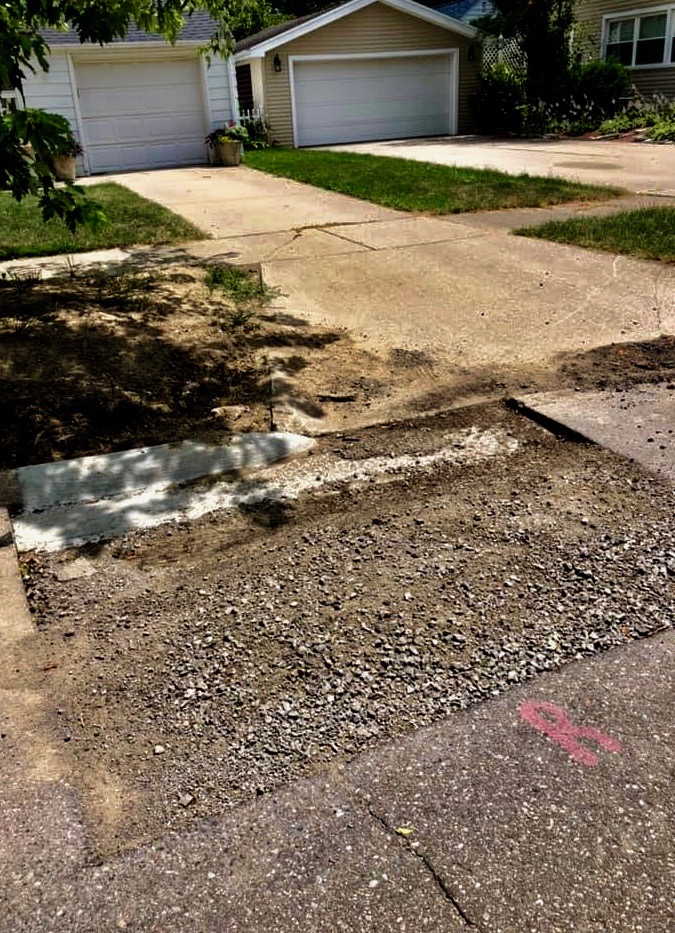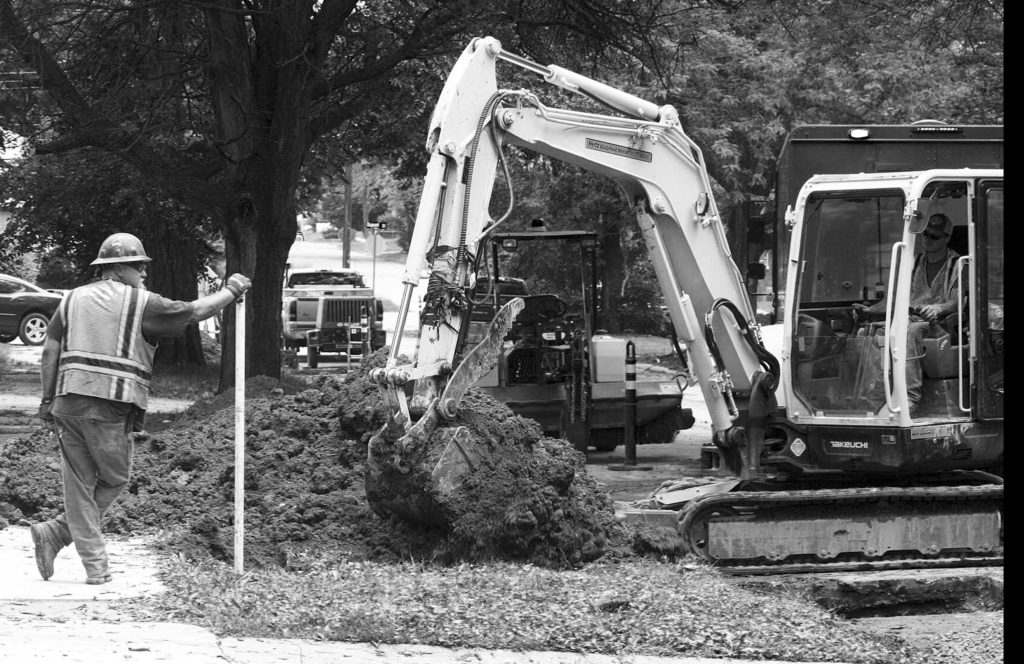By Jan Worth-Nelson and Tom Travis
When will the residents of Flint get their lawns and sidewalks restored following three years of water pipe excavations and replacement?
The answer to that, yet another sign of how elusive “closure” can be in the years’ long community water crisis, is apparently — eventually.
Like many other aspects of the water crisis, the details are a labyrinth of federal, state and city funds and bureaucracies, along with city council bickering, protests over the bidding process, suggestions of preferential treatment, resolutions and “rescissions,” votes and revotes. It’s all enough to confuse and exasperate even the most avid observers, while thousands still wait for their promised “restoration.”
[However, Friday night, following a protracted rebid process, MLive reported the city announced the lowest bid on the restoration work went to Goyette Mechanical–for the second time. Goyette’s original bid in June, the lowest of that round, had been accepted and then rescinded by the city. The contract still will need to be approved by City Council, which is scheduled to meet at 5:30 Monday.
The June bid had been $12.1 million. Friday’s low bid, following a change in the specifications, was $8.9 million. W.T. Stevens came in second with $10.2 million.]
“About 10 days ago they came and put more rocks on this,” said Kevin Smith, standing outside his home at 1626 Dupont. “They keep doing that, just putting rocks as the hole goes down.”
Smith said the street work was originally done about eight months ago. Asked how he felt the restoration was going, Smith said, “It seems everything on the north side is falling apart but downtown is getting built up.” Smith expressed concern that gentrification is a problem in our city and the north side is being forgotten.

621 Greenfield (Photo by Nikki Kohn)
So the bids begin…
The latest drama began with the process of soliciting bids and doling out contracts for Phase Six of the FAST Start Program – the city’s name for the process of replacing the city’s pipes and restoring the damage to curbs, sidewalks, lawns and streets left behind — now about 13,000 to 15,000 addresses.
The work is being funded out of the settlement of a lawsuit brought by the ACLU, the Concerned Pastors for Social Action, Melissa Mays and the National Resource Defense Council. Other funds have come from $100 million federal money from the Environmental Protection Agency (EPA) distributed to Flint through the state of Michigan’s Department of Environmental Quality (now renamed the Michigan Department of Environment, Great Lakes and Energy (EGLE) via the Water Infrastructure Improvements for the Nation (WIIN) Act of 2015-16.
June 24, following a bid process through the City’s procurement office for restoration work on the thousands of lawns where pipe excavation and replacements have occurred, Goyette Mechanical was identified as the low bidder at $12.1 million. The council approved a resolution to award the contract.
Then city administration changes its mind
But two weeks later, the city administration called a 4 p.m. emergency meeting with all seven contractors and announced that it intended to reopen the bid process. Later that same evening at a special affairs committee meeting of the City Council, Goyette project manager Joe Parks, who had been at the earlier meeting, described the administration’s action and expressed vigorous objection to re-opening the bid process.
Councilperson Eric Mays called for the mayor and city officials to come to council to explain the restoration process and their decision to rebid. The rest of the council agreed and scheduled a special meeting for the following Wednesday.
At that July 10 special meeting, only City Administrator Steve Branch appeared and Goyette representative Parks again attended. Branch said the city planned to put the work out for rebid. Again, Parks strenuously protested.

Joe Parks (Photo by Ed Custer)
Branch and others from city administration said the reason for rescinding Goyette’s originally accepted bid was that specifications for the work had been changed, from 11 items to four. When the bids for four items only were re-calculated, the winning bidder was W.T. Stevens at $10.2 million.
Trying to explain what happened, Seventh Ward Councilperson Monica Galloway explained to East Village Magazine, “When they opened up the bids, Goyette came out as the lowest responsible bidder. They were approved for the resolution that came before council. But when the contract was being put together, all of those 11 items were not included [by the city].”
Sumarizing Branch’s explanation to council, Mays attempted to confirm the city’s Purchasing Department and Department of Public Works were who decided to change the bid elements after the fact from 11 to 4.
“They (the city administration) recognized that we might not use seven of the items (in completing the work) but that we might only use four,” Galloway said.
But since the bids already had been submitted, opened, and acted upon, the total from Goyette (at $12 million) and the others already stood and Parks contended Goyette had an accepted bid. The fact that everybody saw everybody’s else’s bids before the new specs for the bids were issued contaminated the process, he said.
In a July 2 letter to the city, MLive reported, Parks argued Flint’s decisions regarding its restoration work were “questionable.”
Parks wrote, “This decision is being made by the city based on nepotism and outright favoritism for certain contractors with personal relationships with city officials and we will stay quiet no longer.”
According to an MLive account, Parks said he believed “allowing a re-bid on the restoration work after council voted not to rescind a resolution awarding Goyette the $12 million contract ‘violates the City of Flint Code.”
In fact, MLive reported, the city “can reject any bid if it’s in the public’s best interest, but must clearly state how the public’s best interest is affected in its notice rejection.” MLive reported no such notice had been filed.
State asks for information about bid process
The story got more complicated when the State of Michigan, which channels the funds, asked for clarification of the city’s bid process.
In an email Eric Pocan, senior project manager from EGLE, asked why only four of the eleven bid items were used in the re-calculations of the lowest bidder. Flint DPW director Rob Bincsik replied that when looking at the addresses left to be completed, the four identified are the “most common items used to complete the restorations.”
“There are other items included in the bid document that will on occasion be used, but they don’t encompass the majority of the work and therefore weren’t used in the esimates for awards,” he wrote, adding that if the city sees “considerably different percentages of lead vs. copper, these numbers will have to be changed to meet the demand of the project in the future.”
After the emails from Pocan at the state the city administration decided to rebid, setting a rebid date of July 19.
On July 12 Goyette filed a formal protest, signed by Parks, objecting to the city’s recission of its contract after council approval and reapproval, and calling the city’s actions “unethical.”
“It was only after Goyette’s bid was accepted and approved did the Department of Purchasing recalculate the bids it received for the Phase Six project to realize the ‘discrepancy’ in bids. This recalculation is improper,” he wrote, citing the City of Flint Code 18-21.3 (9)
Fields questions bid process change
In response to the news of the state’s inquiries, Fourth Ward Councilwoman Kate Fields stated to Steve Branch at the July 17 council meeting, “This looks like you were trying to direct this contract to certain entities rather than the actual low bidder. It’s clear the state didn’t tell you you had to rebid–in no way, shape or form.
“All they wanted to know,” she contended, “was that you had a process and you followed the process for bidding.”
However, Goyette ultimately withdrew its protest in order to rebid, after Purchasing Director Joyce McClane clarified a rebid could not legally proceed with a protest pending.
Goyette also had filed a lawsuit to stop the rebidding. The case is still pending, but 7thCircuit Court Judge F. Kay Behm declined to enter a temporary restraining order as Goyette had requested.
Rebids for the restoration work closed at 5 p.m. Friday. City Council is scheduled to meet at 5:30 Monday to receive the lowest bid — once again — from Goyette.
In the meantime, thousands of Flint residents continue to step around, mow around and drive around the various holes and bumps still left to remind them that the water crisis has left many scars.
This story was updated Sunday, July 21 to clarify that 7th Circuit Court Judge Kay Behm did not dismiss the Goyette lawsuit. She did decline to issue a temporary restraining order as Goyette had requested–Ed.
EVM Editor Jan Worth-Nelson can be reached at janworth1118@gmail.com.
EVM Staff Writer Tom Travis can be reached at tomntravis@gmail.com.
EVM Staff Writer Harold C. Ford contributed to this report. He can be reached at hcford1185@gmail.com.

Goyette workers at Copeman Boulevard in the summer of 2017 (Photo by Ed Custer)


You must be logged in to post a comment.